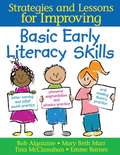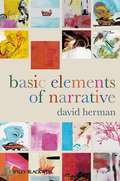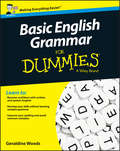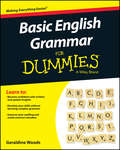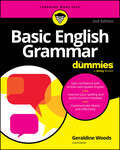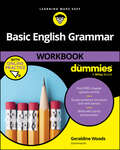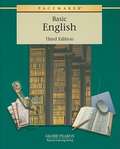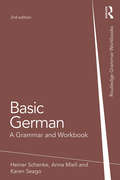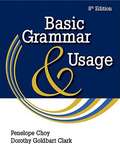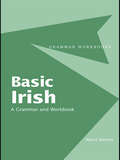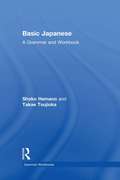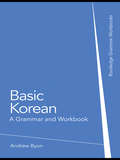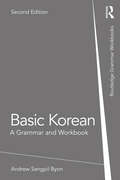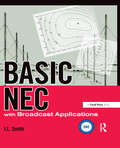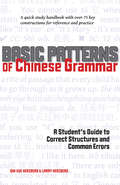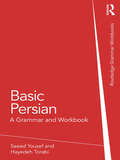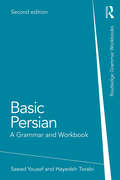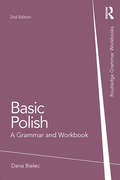- Table View
- List View
Basic Early Literacy Skills: Strategies and Lessons for Improving
by Bob Algozzine Tina Mcclanahan Emme Barnes Mary Beth MarrBasic Early Literacy Skills provides all the resources necessary for educating readers from grades K-3.
Basic Elements of Narrative: An Introduction
by David HermanBasic Elements of Narrative outlines a way of thinking about what narrative is and how to identify its basic elements across various media, introducing key concepts developed by previous theorists and contributing original ideas to the growing body of scholarship on stories. Includes an overview of recent developments in narrative scholarship Provides an accessible introduction to key concepts in the field Views narrative as a cognitive structure, type of text, and resource for interpersonal communication Uses examples from literature, face to face interaction, graphic novels, and film to explore the core features of narrative Includes a glossary of key terms, full bibliography, and comprehensive index Appropriate for multiple audiences, including students, non-specialists, and experts in the field
Basic English Composition
by Bonnie L. WalkerHelp students to build a strong vocabulary foundation and develop a full understanding of the English language.
Basic English Grammar
by Betty Schrampfer Azar Stacy A. HagenClear, direct and comprehensive, the Azar Grammar Series blends tried-and-true grammar teaching with communicative activities. Program Highlights Clear charts and explanations * Student-friendly grammar charts with clear information. * Examples accompanied by clear explanations. * Minimal grammar terminology for ease of understanding. In-depth grammar practice * Immediate application of grammatical forms and meanings. * A variety of exercise types including warm-up, comprehension, completion, reading, listening, interview, and writing. * Interactive pair and group work using target grammar. Comprehensive, corpus-informed grammar syllabus * The verb-tense system, modals, gerunds, and infinitives. * Nouns, articles, pronouns, and agreement. * Sentence patterns, clauses, connectives, and more. * Written forms, spelling, and punctuation; spoken forms and pronunciation.
Basic English Grammar
by Bonnie L. WalkerThis comprehensive text builds and reinforces basic language skills. The high-interest, easy-reading lessons keep students involved as they learn parts of speech and sentence construction. Frequent examples throughout the text help students see the relevance of learning grammar.
Basic English Grammar For Dummies (UK Edition)
by Geraldine WoodsEnglish is a hard language to get right. It's all too easy to make simple mistakes, whether writing or speaking. Those mistakes could stop you from getting a job or embarrass you in social situations. This book will help you build you confidence by telling you what you need to know to improve your English. It avoids complicated grammar and uses plenty of examples and brief exercises to show you how it's done and help you practice. Discover common spelling errors and how to avoid them. Learn how to structure sentences to make yourself easily understood. Find the right tone and style for the situation, whether application letter, email, text or phone call. Written in clear English, and free or jargon, this is an ideal aid if English is your first language and you want to brush up your skills and perhaps feel more confident teaching your children. It is also perfect for overseas students, and those for whom English is a second language, wherever they live. The simple language and explanations mean you can find out what you need to know and start building your skills straightaway. This book is suitable for the United Kingdom and those learning 'UK English'. If you wish to learn 'American English' look out for Basic English For Dummies - US Edition.
Basic English Grammar For Dummies - US
by Geraldine WoodsThe easy way to brush up on your English skills Is it good or well? There, their, or they're? Some people don't have to think twice about using proper English, but for the rest of us it can get tricky and confusing. Whether you're writing or speaking, it's all too easy to fall prey to simple mistakes that will represent you in a less-than-desirable light—which can potentially cost you a job or put you in an embarrassing social situation. Avoiding complicated grammar rules, Basic English For Dummies sticks to the basics and makes it easy to get up and running on what you need to know to partake in successful everyday communication, no matter your audience or medium. Inside, you'll find plenty of examples and exercises, guidance on how to structure sentences to make yourself easily understood, and so much more. In no time, you'll leave the 'me or I?' debate at the door and speak and write confidently and correctly. Plus, you'll expand your vocabulary, find the right tone and style you want to convey in your communication, and avoid common English language pitfalls. Includes quizzes and self-tests Provides guidance on composing letters, emails, texts, and phone calls Explains in plain English how to improve your English skills Gives you instruction and exercises on putting your skills to practice right away If English is your first language, but you missed or have forgotten the nuances that were taught in school, Basic English For Dummies is your go-to guide. It is also ideal for those learning English as a second language.
Basic English Grammar For Dummies - US
by Geraldine WoodsYour go-to guide for expressing yourself correctly in the most spoken language in the world Basic English Grammar For Dummies is the bestselling grammar guide that's perfect for readers who want to improve their knowledge of the English language. This well-rounded primer covers the building blocks of English grammar, giving you an introduction to parts of speech, sentence structure, punctuation, capitalization, and more. Real-world examples help you understand the rules of Standard English — and when you can break them! You can test your progress with quiz questions on every topic. This updated edition explains current usage (including pronouns and presentation slides) and gives you handy rules to remember, so you can speak and write with confidence. Make the English language learning process engaging and stress-free with this Dummies guide. Learn about parts of speech, sentence structure, punctuation, and capitalization Become a better writer and get answers to all your questions about English Recognize and avoid common grammar mistakes and misuse of words Apply your grammar knowledge in everyday scenarios at work, in school, and in general communication Anyone who's new to the English language or needs a little refresher on tricky grammar rules will enjoy Basic English Grammar For Dummies. This book makes learning the English language accessible so you can feel confident at work, in school, and in life.
Basic English Grammar Workbook For Dummies (+ Chapter Quizzes Online)
by Geraldine WoodsSimple explanations and plenty of grammar practice—for native speakers and learners alike Basic English Grammar Workbook For Dummies is full of examples and practice questions that make it easy to master English grammar. You can learn the rules—and exceptions to those rules—with hands-on exercises and clear explanations of the answers. With the help of this easy-to-understand guide, you'll be an expert at pronouns, word order, passive voice, verb tenses, and punctuation. By the end, you'll be speaking clearly, writing correctly, and impressing bosses, teachers, and even the pickiest grammarian. Work your way through the most important topics in English grammar, with hands-on exercises, answers, and explanations Practice using formal and informal English, choosing the correct expressions for any situation Learn about pronouns and inclusive language, including the changing rules about “they” and “them” Access free online chapter quizzes for even more practice, so you can solidify what you've learned If you're studying English grammar in school or on your own—or if you're looking for resources to teach grammar—this is the Dummies guide for you.
Basic English Pacemaker (Third Edition)
by Globe FearonThis book provides an understanding of basic English skills, how it is relevant in everyday life and thereby help people communicate effectively with one another.
Basic English Review
by Karen Schneiter WilliamsLearn the basics of English--the easy way! This popular text takes a unique and time-proven approach to understanding the Fundamentals of English. The latest edition of BASIC ENGLISH REVIEW 9e has a strong one-column design making it an easier read. New features/activities are targeted toward Career. Soft skills, business dress, etiquette, and protocol are addressed. Through logically organized concepts, short explanations, and an abundance of skill practice, users will gain confidence and skill in all English areas. Integrated throughout are pretests, posttests, proofreading tips, and writing activities. This user-friendly edition motivates with activities that promote attention to detail, methods for remembering specific grammar rules and activities that can be completed using technology.
Basic German: A Grammar and Workbook (Routledge Grammar Workbooks)
by Heiner Schenke Anna Miell Karen SeagoBasic German: A Grammar and Workbook comprises an accessible reference grammar and related exercises in a single volume. The book introduces German people and culture through the medium of the language used today, covering the core material which students would expect to encounter in their first years of learning German. Each of the 29 units presents one or more related grammar topics, illustrated by examples which serve as models for the exercises that follow. These wide-ranging and varied exercises enable the student to master each grammar point thoroughly. Features include: • Clear grammatical explanations with examples in both English and German • Authentic language samples from a range of media • Checklists at the end of each unit to reinforce key points • Cross-referencing to other grammar chapters • Full exercise answer key • ‘Did you know?’ sections with extra learning tips on specific grammar points and insights into current usage of German • Glossary of grammatical terms The new edition has been thoroughly revised, including more varied exercises for practice, and grammar points have been reformulated to use a more learner-centred approach. Suitable for independent study and for class use, Basic German: A Grammar and Workbook is the ideal reference and practice book for beginners, as well as for students with some knowledge of the language. ?
Basic Goals in Spelling (7th edition)
by William A. Kottmeyer Audrey ClausSpelling primer for children.
Basic Grammar and Usage
by Penelope Choy Dorothy Goldbart ClarkMaster the basics of the English language with BASIC GRAMMAR AND USAGE! Covering the important rules of grammar, usage, and syntax, this developmental English book provides you with clear explanations and numerous examples to help you succeed. Exercises help you strengthen your grammar and the book-specific website has grammar reviews that ensure that you master the material.
Basic Irish: A Grammar and Workbook (Grammar Workbooks)
by Nancy StensonBasic Irish: A Grammar and Workbook provides a jargon-free introduction to the most commonly used grammatical structures within the Irish language. Focusing on the repeated use of grammatical patterns, this Workbook develops an understanding of the structures presented, making the forms familiar and automatic for learners. This user-friendly workbook includes: terminology introduced and explained with multiple examples exercises in the grammatical forms introduced in the text translation exercises an exercise key.
Basic Italian: A Grammar and Workbook (Grammar Workbooks)
by Ian Higgins Stella PeyronnelIntroducing Italian culture and people through the medium of the language used today, Basic Italian: A Grammar and Workbook provides readers with the basic tools to express themselves in a wide variety of situations. Presenting twenty-three individual grammar points in lively and realistic contexts, Basic Italian is an accessible reference grammar with related exercises in one, easy to follow volume. Each unit consists of jargon-free explanations and comparisons with English, which focus upon the more common difficulties experienced by learners of Italian. Features include: * contemporary examples in both Italian and English * grammar tables for easy reference * full exercise answer key * glossary of grammatical terms. Basic Italian is the ideal reference and practice book for beginners, as well as for students with some knowledge of the language.
Basic Japanese: A Grammar and Workbook (Routledge Grammar Workbooks)
by Shoko Hamano Takae TsujiokaBasic Japanese: A Grammar and Workbook comprises an accessible reference grammar and related exercises in a single volume.This book presents 25 individual grammar points, covering the core material which students would expect to encounter in their first year of learning Japanese. Divided into two parts, the first part outlines fundamental components of Japanese including the writing system, pronunciation, word order, particles and conjugation patterns, while the second part builds on this foundation by introducing basic grammatical patterns organised by the task they achieve. Grammar points are followed by contextualised examples and exercises which allow students to reinforce and consolidate their learning. Key features include: clear, accessible format many useful language examples transliteration of all examples jargon-free explanations of grammar abundant exercises with full answer key subject index. Basic Japanese is suitable both for class use and independent study making it an ideal grammar reference and practice resource for both beginners and students with some knowledge of the language.
Basic Korean: A Grammar and Workbook (Grammar Workbooks Ser.)
by Andrew Sangpil ByonKorean: A Grammar and Workbook comprises an accessible reference grammar and related exercises in a single volume. This workbook presents twenty-five individual grammar points in lively and realistic contexts, covering the core material which students would expect to encounter in their first year of learning Korean. Grammar points are followed by examples and exercises which allow students to reinforce and consolidate their learning. Basic Korean is suitable for both class use as well as independent study. Key features include: abundant exercises with full answer key all Korean entries presented in Hangul with English translations glossary of grammatical terms. Clearly presented and user-friendly, Basic Korean provides readers with the essential tools to express themselves in a wide variety of situations, making it an ideal grammar reference and practice resource for both beginners and students with some knowledge of the language. Andrew Sangpil Byon is Assistant Professor at the State University of New York at Albany, where he teaches courses in Korean language and civilization.
Basic Korean: A Grammar and Workbook (Grammar Workbooks)
by Andrew Sangpil ByonThe revised second edition of Basic Korean: A Grammar and Workbook is an accessible reference grammar and workbook in one volume. The text can be used in conjunction with any primary textbook, both as a practice book to reinforce learning and as a reference guide to the basics of Korean grammar. This book is comprised of 26 units covering key aspects of Korean grammar students would expect to encounter in their first year learning the language. Grammatical descriptions are followed by examples and exercises which allow students to reinforce and consolidate their learning. This new edition has been updated and enhanced to include more varied exercises and contemporary vocabulary and dialogues. Clearly presented and user-friendly, Basic Korean provides readers with the essential tools to express themselves in a wide variety of situations, making it an ideal reference grammar and practice resource for both beginners and students with some knowledge of the language.
Basic NEC with Broadcast Applications
by J.L. SmithBasic NEC with Broadcast Applications addresses computer modeling of MF directional broadcast antennas and illustrates the assets and liabilities of the Numerical Electromagnetic Code (NEC). The book's "how to" approach reveals the fundamentals of NEC operation, teaches broadcast applications and shows the reader how to use NEC-2 to: model non-radiating networks, verify calculations, detune unused towers, design top-loaded and skirted antennas, minimize coding by moving and duplicating structures, and much more! Complete with downloadable resources, the book is an invaluable toolkit with software necessary for the design and analysis of broadcast antenna arrays.
Basic Patterns of Chinese Grammar
by Qin Xue Herzberg Larry HerzbergHere is a concise guide to supplement any course of study and help with homework, travel, and test preparation. Topics include word order, time, nouns, verbs, adjectives, word choices with verbs and adverbs, and letter writing. The simple format has one goal: quick mastery and growing confidence.Qin Xue Herzberg, a graduate of Beijing Normal University, has taught Chinese for decades and has been an upper-level Chinese professor at Calvin College for ten years.Larry Herzberg did his PhD work in Chinese and founded the Chinese language programs at Albion College and Calvin College.Qin and Larry live in Grand Rapids, Michigan, and are co-authors of the popular China Survival Guide as well as Chinese Proverbs and Popular Sayings.
Basic Persian: A Grammar and Workbook (Grammar Workbooks)
by Saeed Yousef Hayedeh TorabiBasic Persian: A Grammar and Workbook comprises an accessible reference grammar and related exercises in a single volume. This book presents twenty grammar units, covering the core material which students would expect to encounter in their first year of learning Persian. Grammar points are followed by multiple examples and exercises which allow students to reinforce and consolidate their learning. Key features include: Clear, accessible format Many useful language examples Jargon-free explanations of grammar Abundant exercises with full answer key A glossary of Persian-English terms Subject index Rigorous yet engaging, Basic Persian is suitable for both class use and independent study, making it an ideal grammar reference and practiceresource for beginners and students with some knowledge of the language.
Basic Persian: A Grammar and Workbook (Grammar Workbooks)
by Saeed Yousef Hayedeh TorabiThis fully revised second edition of Basic Persian: A Grammar and Workbook comprises an accessible reference grammar and related exercises in a single volume. This book presents twenty grammar units, covering the core material which students would expect to encounter in their first year of learning Persian. Grammar points are followed by multiple examples and exercises which allow students to reinforce and consolidate their learning. Key features include: • a clear, accessible format • many useful language examples • jargon-free explanations of grammar • abundant exercises with full answer key • a glossary of Persian-English terms • a subject index Rigorous yet engaging, Basic Persian is suitable for both class use and independent study, making it an ideal grammar reference and practice resource for both beginners and students with some knowledge of the language.
Basic Polish: A Grammar and Workbook (Routledge Grammar Workbooks)
by Dana BielecBasic Polish presents concise explanations of grammar with related exercises, to build confidence in using the modern language. Assuming no previous knowledge of Polish, the book’s step-by-step approach guarantees a thorough grounding in the basics of grammar. Each of the forty units introduces particular grammar points. Clear and concise explanations are supported by a wide range of examples and exercises to allow students to practise and consolidate their learning. Later units also reinforce material taught in earlier ones. Key features include: clear, accessible format many useful language examples jargon-free explanations of grammar abundant exercises with a full answer key notes on the Polish alphabet, pronunciation and stress Polish-English vocabulary subject index. This second edition has been revised to include updated examples and explanations. It also offers five new appendices containing a comprehensive summary of grammar functions, guidance on studying an inflected language, and helpful information on question words, the important verbs by? and mie? and perfective and imperfective verb aspects. Written by an experienced language teacher and author, Basic Polish is the ideal introduction to the structures and expressions most widely used in spoken and written Polish. It is suitable for both independent use and classroom study.
